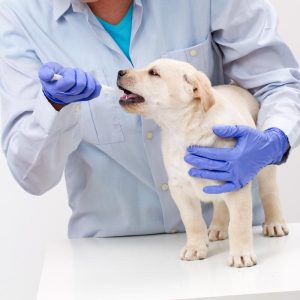
Why Vaccinate?
Just like people, vaccinating your puppy or kitten and continuing to vaccinate through out their lives can prevent disease.
What We Vaccinate Against
- Distemper is a highly contagious, airborne viral disease. It affects the lungs, intestines, and brain.
- Canine Adendovirus Type 2 cause respiratory and enteric disease.
- Leptospirosis is a bacterial disease of the urinary system and can be spread to humans.
- Parainfluenza is infectious bronchitis,
- Parvovirus, a viral disease of the intestines, can be hard to treat once there is a positive diagnosis. It is also highly contagious.
- Corona, another viral disease of the intestines,
- Rabies is a viral disease that is ALWAYS fatal. It can be transferred to humans via saliva. Most cities require all dogs to recieve a rabies vaccine.
- Feline Rhinotracheitis is an upper respiratory virus. It is cause by the herpes virus. It is very contagious and can cause serious disease. It can be fatal in young kittens.
- Feline Calicivirus is another highly contagious respiratory virus.
- Feline Panleukopenia is a highly contagious viral gastroenteritis. Mortality rate in infected kittens is 50-90%.
Vaccination Schedule
Puppies: 6 weeks to a year
6-8 weeks: Initial distemper vaccine (distemper, canine adenovirus type 2, parainfluenza, parvovirus, and corona virus)
11-12 weeks: Second Distemper booster vaccine
16 weeks: Third Distemper booster and Rabies
Distemper vaccine is boostered yearly.
Rabies first vaccine is good for 1 year. The second and subsequent rabies vaccines are good for 3 years.
There are two additional annual vaccines to consider; lyme and bordetella.
- Lyme disease is a tick borne disease. Even if your pet is on monthly topical flea and tick preventative this vaccine is recomended if you live in an area that has a tick season, your dog is an outdoor dog, or if your dog is a hunting dog.
- Bordetella aka: kennel cough is required by kennel and grooming facilities. If you plan on kenneling your dog while you are away or intend to have them professionally groomed we recommend getting this vaccine.
Lyme vaccine needs to be boostered 3-4 weeks after the initial vaccine and then given annually.
Kittens: 6 weeks to a year
6-8 weeks: Initial feline distemper vaccine (feline rhinotracheitis, calici, panleukopenia, chlamydia psittaci)
11-12 weeks: Second Feline Distemper booster vaccine
16 weeks: Third Distemper booster and Rabies
Feline Distemper vaccine is boostered yearly.
Rabies first vaccine is good for 1 year. The second and subsequent rabies vaccines are good for 3 years.
An additional annual vaccine to consider; feline leukemia and feline immunodeficency virus.
- Feline leukemia (FeLV) is a virus that can be fatal. It is spread through saliva and nasal secretions, but also in urine, feces, and milk from infected cats this is how a mother cat would infect her kittens. If you intend for your cat to spend any time outside we recomend this vaccine. Cats and kittens need to be tested for FeLV before the vaccine is given.
- Feline Immunodeficency Virus is a virus that can be fatal. It is transmitted through bite and scratch wounds when the saliva from an infected cat enters the bloodstream. It is also passed from mother cat to kittens in utero. If you intend for your cat to spend any time outside we recommend this vaccine. Cats and kittens need to be tested for FIV before the vaccine is given.
The FeLV/FIV vaccine is one vaccine that needs to be boostered 3-4 weeks after the intial vaccine and then given annually.
